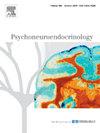Changes in affect variability after starting gender-affirming hormone therapy
IF 3.4
2区 医学
Q2 ENDOCRINOLOGY & METABOLISM
引用次数: 0
Abstract
Negative affect variability is determined by how often and how strongly negative affect changes over time. Cisgender women report greater variability in affect than cisgender men. It has been suggested that sex hormone changes may influence affect variability. Transgender people frequently opt to use sex hormones in the form of gender-affirming hormone therapy (GAHT), but the extent to which GAHT can change negative affect variability is not yet clear. Therefore, this study aims to study changes in negative affect variability after starting GAHT.
We have included data from 92 participants from the RESTED study: 47 persons starting masculinizing hormones (MH), i.e. testosterone, and 45 persons starting feminizing hormones (FH), i.e., estrogens and anti-androgens. Participants completed up to 7 consecutive daily diaries at each of three time points: before starting GAHT, and after 3 and 12 months of GAHT. The daily diaries collected participants’ reports on symptoms related to negative affect: experienced low mood, less interest, tense feelings and restless feelings. We have used linear mixed models to compare negative affect variability during one week, corrected for mean negative affect, between groups (MH versus FH) and measurement time points.
Results show that in the MH group, variability in tense feelings and restless feelings decreased after 3 and 12 months of GAHT, respectively. In the FH group, variability in low mood increased after 3 months and 12 months of GAHT, as did variability in restless feelings after 12 months of GAHT. Group comparisons indicate significant group differences in changes in variability in low mood and restless feelings, with stronger increases in variability of negative affect in the FH group compared to MH group after 3 and 12 months of GAHT.
Our findings indicate that variability patterns in negative affect in transgender persons change after starting GAHT, with participants who start masculinizing hormones moving to a profile which more closely resembles that of cisgender men and participants who start feminizing hormones moving to a profile which more closely resembles that of cisgender women. Future studies should focus on measuring both negative and positive affect variability during GAHT, preferably through multiple measurements per day, taking into account diverse social and daily contextual factors during GAHT.
开始性别确认激素治疗后情绪变化的变化
消极影响的可变性取决于消极影响随时间变化的频率和强度。与男性相比,顺性别女性在情感上的差异更大。有人认为性激素的变化可能会影响影响的可变性。变性人经常选择以性别确认激素疗法(GAHT)的形式使用性激素,但GAHT能在多大程度上改变负面影响的可变性尚不清楚。因此,本研究旨在研究GAHT启动后消极情绪变异性的变化。我们纳入了来自rest研究的92名参与者的数据:47人开始男性化激素(MH),即睾酮,45人开始女性化激素(FH),即雌激素和抗雄激素。参与者在三个时间点分别完成了多达7个连续的每日日记:在GAHT开始之前,以及在GAHT 3个月和12个月之后。每日日记收集了参与者对负面影响相关症状的报告:情绪低落、兴趣减退、紧张感和不安感。我们使用线性混合模型来比较一周内各组(MH与FH)和测量时间点之间的负面影响变异性,校正了平均负面影响。结果显示,MH组在GAHT治疗3个月和12个月后,紧张感觉和不安感觉的变异性分别下降。在FH组中,在GAHT治疗3个月和12个月后,情绪低落的变异性增加,在GAHT治疗12个月后,不安情绪的变异性也增加。组间比较表明,在低情绪和不安情绪的变异性变化方面,组间存在显著差异,在GAHT治疗3个月和12个月后,FH组的负面情绪变异性比MH组增加得更强。我们的研究结果表明,在接受GAHT治疗后,变性人的负面情绪变化模式发生了变化,参与者的男性化激素开始向与顺性男性更接近的侧面移动,而参与者的女性化激素开始向与顺性女性更接近的侧面移动。未来的研究应侧重于测量GAHT期间的消极和积极影响变异性,最好通过每天多次测量,考虑到GAHT期间的各种社会和日常背景因素。
本文章由计算机程序翻译,如有差异,请以英文原文为准。
求助全文
约1分钟内获得全文
求助全文
来源期刊

Psychoneuroendocrinology
医学-精神病学
CiteScore
7.40
自引率
8.10%
发文量
268
审稿时长
66 days
期刊介绍:
Psychoneuroendocrinology publishes papers dealing with the interrelated disciplines of psychology, neurobiology, endocrinology, immunology, neurology, and psychiatry, with an emphasis on multidisciplinary studies aiming at integrating these disciplines in terms of either basic research or clinical implications. One of the main goals is to understand how a variety of psychobiological factors interact in the expression of the stress response as it relates to the development and/or maintenance of neuropsychiatric illnesses.
 求助内容:
求助内容: 应助结果提醒方式:
应助结果提醒方式:


